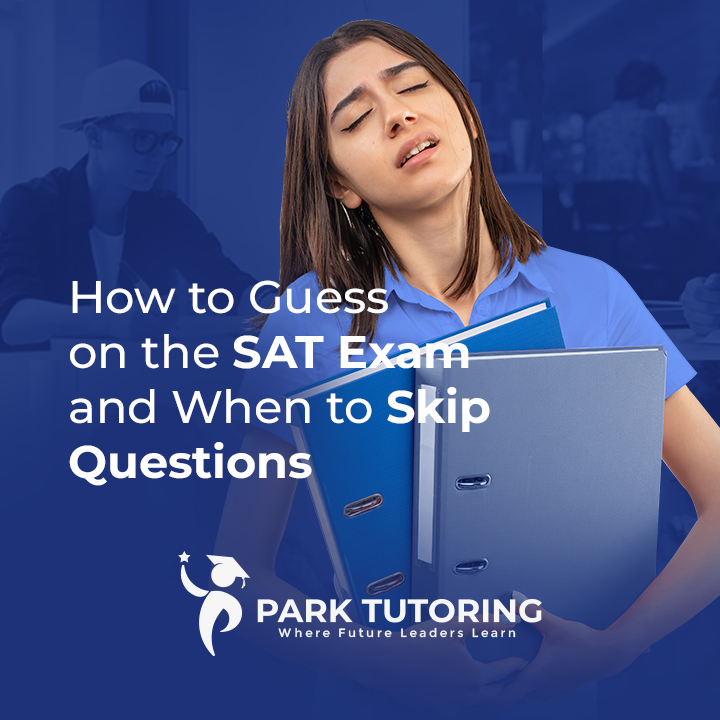The SAT exam, administered by the College Board, is a challenging exam, and sometimes, you’ll come across questions that leave you stumped. Instead of wasting or panicking, it’s important to have a smart strategy for guessing. With no penalty for wrong answers, strategic guessing can actually improve your SAT score. But should you ever skip a question? Let’s break down the best guessing techniques and when it makes sense to move on.
Why Guessing on the Scholastic Assessment Test Matters
Unlike older versions of the SAT exam, there’s no penalty for incorrect answers. That means you should never leave a question blank, even if you have no clue about the answer. This is particularly important in the Evidence-Based Reading and Writing section, where strategic guessing can significantly impact your score. A random guess still gives you a 25% chance of picking the correct option. But if you guess strategically, your chances improve. That’s why SAT prep is so important, it teaches you how to approach tough questions logically.
Best Guessing Strategies for High School Students Taking the SAT
Eliminate Wrong Answers First
Before you start guessing randomly, try to eliminate one or two incorrect choices. The SAT exam is designed to trick test-takers with misleading answers, but if you can spot them, you increase your odds of guessing correctly.
- Look for extreme or absolute words like “always” or “never” in reading questions—these are often incorrect.
- In SAT math, plug in answer choices when possible to see what works.
- If two answers seem too similar, they’re likely both wrong.
High school students who practice eliminating wrong answers can improve their chances of guessing correctly.
2. Use Context Clues in the Reading and Writing Section
If you’re stuck on a reading comprehension question, re-read the sentence before and after the referenced line. Many times, the answer is hinted at in the surrounding text. In SAT Writing, check for grammatical consistency and look for common SAT grammar rules like subject-verb agreement.
With the transition to the digital SAT, becoming familiar with the digital format can also help you use context clues more effectively.
3. Stick to Your First Instinct
Overthinking can lead you to change a correct answer to a wrong one. Studies show that your first instinct is often right, especially when you have some knowledge of the topic. If you’re unsure but leaning toward an answer, go with it. Remember, your high school GPA is also a crucial factor in college admissions, so trust your instincts and focus on your overall academic performance.
4. Look for Patterns in Answer Choices
If you’re truly stuck, try identifying answer patterns:
- If two choices are opposites, one is likely correct.
- If one answer is much longer or more complex than the others, it might be right.
On the SAT Math section, if a question asks for the “best estimate”, eliminate extreme numbers first. Taking practice tests can help you recognize these patterns and improve your guessing strategies.
5. Use the Letter-of-the-Day Strategy for Random Guesses
If you run out of time and need to guess quickly, choose one letter (A, B, C, or D) and stick with it. This prevents you from randomly switching answers and gives you a consistent probability of getting some right.
Make sure to register online for the SAT exam well in advance to avoid any last-minute issues.
When Should You Skip a Question on Test Day?
While you should never leave an answer blank, skipping temporarily can help you manage your time better.
1. If a Question is Taking Too Long
Each section of the SAT exam is timed, so you need to keep moving. If you spend more than a minute struggling with a question with your letter of the day. This ensures you’re maximizing your score.
2. If You’re Stuck and Running Out of Time
If there are only a few minutes left, go back and fill in every unanswered question with your letter of the day. This ensures you’re maximizing your score.
3. If You’re Second-Guessing Too Much
If you’ve read the question multiple times and keep changing your answer, trust your gut and move on. Overanalyzing can lead to errors.
Also, be mindful of registration deadlines to ensure you have ample time to prepare and practice.
The Best Way to Improve? SAT Prep with Practice Tests from Park Tutoring
While guessing techniques can help, the best way to boost your SAT score is to reduce the need for guessing altogether. The more prepared you are, the fewer tough questions you’ll encounter.
Additionally, fee waivers are available for eligible students to help cover the cost of registration and other services.
Why Choose Park Tutoring for SAT Prep?
- Expert Tutors: Learn from top tutors who know SAT exam questions and teach proven strategies.
- Personalized Learning: Get a study plan tailored to your strengths and weaknesses.
- Practice Test: Master time management with real SAT-style questions.
- Higher Scores Guaranteed: Students who prep with Park Tutoring see significant score improvements.
Our program includes extensive SAT practice to ensure you are fully prepared for test day.
Don’t leave your SAT score to maybe—get the expert guidance you need. Sign up for Park Tutoring’s SAT prep program today and walk into your test with confidence!
Final Thoughts
Guessing wisely can make a difference on the SAT exam, but preparation is key. By eliminating wrong answers, managing your time, and learning expert techniques through SAT prep, you’ll feel more in control on test day. Take the next step toward your best SAT score, join us at Park Tutoring today in our SAT Prep program and take the next step to academic success! Remember, standardized test scores are a key component of your college admissions, so effective preparation is essential.


